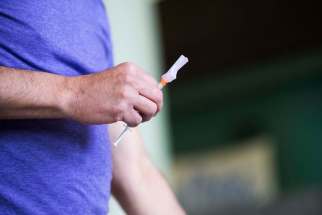Health-care holdouts carry potential for harm
Read this article for free:
or
Already have an account? Log in here »
To continue reading, please subscribe:
Monthly Digital Subscription
$0 for the first 4 weeks*
- Enjoy unlimited reading on winnipegfreepress.com
- Read the E-Edition, our digital replica newspaper
- Access News Break, our award-winning app
- Play interactive puzzles
*No charge for 4 weeks then price increases to the regular rate of $19.00 plus GST every four weeks. Offer available to new and qualified returning subscribers only. Cancel any time.
Monthly Digital Subscription
$4.75/week*
- Enjoy unlimited reading on winnipegfreepress.com
- Read the E-Edition, our digital replica newspaper
- Access News Break, our award-winning app
- Play interactive puzzles
*Billed as $19 plus GST every four weeks. Cancel any time.
To continue reading, please subscribe:
Add Free Press access to your Brandon Sun subscription for only an additional
$1 for the first 4 weeks*
*Your next subscription payment will increase by $1.00 and you will be charged $16.99 plus GST for four weeks. After four weeks, your payment will increase to $23.99 plus GST every four weeks.
Read unlimited articles for free today:
or
Already have an account? Log in here »
Hey there, time traveller!
This article was published 18/10/2021 (1511 days ago), so information in it may no longer be current.
It could have gone a lot worse.
On Day 1 of Manitoba’s vaccine mandate for health-care workers, about 30 individuals provincewide were sent home because they had not been vaccinated and refused the option to be tested.
At first blush, less than three dozen dissidents out of a workforce that numbers in the tens of thousands seems a pretty good result.
Years of miserly contracts, government austerity and value engineering masquerading as reform have battered and demoralized many.
Appearances in this situation, however, can be deceiving.
Although small in number, the 30 holdouts are withdrawing their services from a system that, in many ways, needs them more than they may need the work. If additional staff are encouraged to join their ranks, we could very well see the health-care system brought to its knees.
How could such a small group have that kind of impact on a system that big?
Canada’s health-care system was already chronically short-staffed in many key professional and non-professional groups before COVID-19 struck. Years of miserly contracts, government austerity and value engineering masquerading as reform have battered and demoralized many.
Think back to the beginning of the pandemic, which carved a remorseless swath through the resident populations of hospitals and long-term care facilities.
The virus struck particularly hard in these places because patients had underlying health problems that made them particularly vulnerable. But a shortage of support staff, aides, nurses and physicians made a bad situation much worse.
In other words, COVID-19 did not cause the staff shortages. But the disease was allowed to thrive in an environment where there simply weren’t enough people to care for the vulnerable.
In a classic labour market scenario such as this, where demand for human resource outstrips supply, those working in the health-care system should find themselves in a position of power. However, this is no normal situation.
For the most part, people working within the system have answered the call, working longer and more stressful hours, putting themselves in harm’s way. While there is some variance in most jurisdictions, it appears more than 95 per cent of health-care staff in most provinces have been vaccinated.
It is those five per cent left unvaccinated that pose a real threat, both to patients and to the viability of the health-care system.
It is those five per cent left unvaccinated that pose a real threat, both to patients and to the viability of the health-care system.
Mandates have been somewhat successful in boosting those promising vaccination rates even higher. But again, with such a slim margin for error in staffing, even a handful of holdouts can have a huge impact on service delivery.
You can see this dynamic playing out all across Canada as governments attempt to force all health-care workers to get vaccinated to help protect vulnerable patients and stop new surges in infections.
British Columbia set a hard deadline of Oct. 12, and reports indicate there are only handfuls across the province holding out. Even so, some private personal care home operators are already predicting reductions in service for residents.
Quebec was forced to postpone its health-care vaccine deadline (originally set for Oct. 15) for at least a month, after it was clear several thousand workers were going to accept suspension rather than get vaccinated. Quebec said 94 per cent of all front-line health-care staff had been vaccinated but the system could not operate without the remaining six per cent showing up to work.
Many facilities have, in fact, ramped up hiring so they can make vaccine status a condition of employment and avoid the conflict that comes from forcing an existing employee to get vaccinated. However, while that may work as a solution in some of the non-skilled job classifications, it isn’t going to help in others.
Part of the solution may be to drop the option to get tested in lieu of full vaccinations. Canada’s five biggest private personal care home operators currently require full vaccination and do not offer a testing option. To date, they have not reported many holdouts.
Vaccine-hesitant health-care workers have felt bullied by the combined pressure of government and a public that has overwhelmingly embraced the vaccine. So, it is to be expected some will see the opportunity to hold their ground to see if their employers are bluffing.
Part of the solution may be to drop the option to get tested in lieu of full vaccinations.
Ask the 30 people who were sent home Monday; the employers are not bluffing. Whether that convinces the holdouts, and the larger group of health-care workers who are choosing the testing option, to get vaccinated is another matter altogether.
That tiny group of holdouts may not want to do any harm, but at some point, they may realize what they lack in numbers, they make up for in potential to hurt an already weakened health-care system.
dan.lett@freepress.mb.ca

Born and raised in and around Toronto, Dan Lett came to Winnipeg in 1986, less than a year out of journalism school with a lifelong dream to be a newspaper reporter.
Our newsroom depends on a growing audience of readers to power our journalism. If you are not a paid reader, please consider becoming a subscriber.
Our newsroom depends on its audience of readers to power our journalism. Thank you for your support.
History
Updated on Monday, October 18, 2021 7:12 PM CDT: Fixes typo.
Updated on Monday, October 18, 2021 7:48 PM CDT: Headline fixed.








